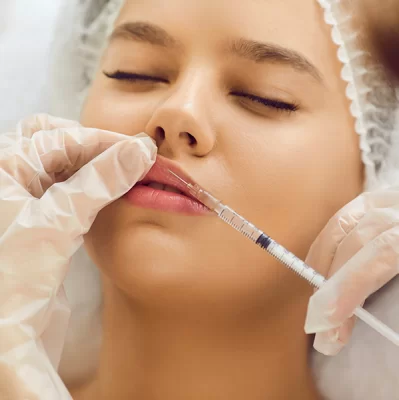Does lip augmentation hurt?
- Does lip augmentation with hyaluronic acid hurt?
- What methods of anesthesia are used during the procedure?
- What factors influence the level of perceived pain?"
- How to prepare for a procedure to minimize discomfort?
- Is there pain and swelling after lip augmentation?
- How to alleviate symptoms during the recovery period?
- When should one refrain from undergoing lip augmentation procedure?
Lip augmentation is a popular cosmetic procedure that involves injecting hyaluronic acid into the lips. Many people fear pain during this procedure, but in reality, it occurs rarely.
Local anesthesia effectively minimizes any discomfort. As a result, up to 90% of patients do not feel strong pain during the procedure. Although pain perception is subjective, the average level is rated as very low - usually just 2 out of 5. The belief in significant pain associated with the procedure is therefore greatly exaggerated.
When enlarging the lips, the priority is patient comfort. To make the procedure as comfortable as possible, various methods of local anesthesia are used. Typically, a numbing cream is applied, which starts to work on the lips after 15-20 minutes, minimizing pain sensations.
However, if you are more sensitive to pain, you can opt for a stronger solution: dental anesthesia. This method completely eliminates any discomfort, ensuring full comfort during the procedure.
Furthermore, many modern fillers with hyaluronic acid already contain lidocaine, which additionally reduces discomfort during the procedure.
Although anesthesia effectively alleviates discomfort during lip augmentation, many factors influence the feeling of pain during the procedure. These factors include:
- individual pain threshold of the patient,
- level of stress and fear, which intensify unpleasant sensations,
- doctor's skills and the technique of administering the filler (linear method, fan technique, or "Russian Lips"),
- the tool used (microcannula minimizes tissue trauma unlike a needle),
- menstrual cycle phase in women - some specialists advise against the procedure just before or during menstruation.
To minimize discomfort during the procedure, it is worth preparing thoroughly for it. During the initial consultation, you will establish a detailed treatment plan together with a specialist. This is the perfect moment to choose the appropriate anesthesia that will ensure safety and maximum comfort. Remember that a positive attitude is extremely important because stress can intensify pain sensations.
Several days before the procedure, be sure to avoid blood-thinning medications (such as aspirin or ibuprofen) and alcohol. By doing this, you will significantly reduce the risk of bruising and hematomas. Always remember to inform the doctor about all medications you are taking, including dietary supplements.
Lip augmentation with hyaluronic acid may involve some transient side effects, which are a natural part of the recovery process. Swelling is normal and typically lasts for a few days. Bruising at the injection sites may also occur, but usually resolves within a week. The lips may be tender and slightly painful. Occasionally, small lumps may be felt, which can be gently massaged away. All of these symptoms are typical and resolve on their own.
After lip augmentation, proper lip care is necessary. To ensure the correct healing process, remember the following guidelines:
- Apply cold compresses to the lips immediately after the procedure to reduce swelling and bruising, speeding up the healing process.
- Maintain proper hydration by drinking plenty of water.
- If you experience pain, you can take paracetamol.
- Avoid taking ibuprofen and other non-steroidal anti-inflammatory drugs (NSAIDs) as they may increase bleeding.
- After a few days, with the doctor's approval, perform gentle lip massages to help distribute the product correctly and support tissue regeneration.
- Don't forget to regularly moisturize your lips.
Lip augmentation, although popular, should not be performed on everyone. Patient safety is always a priority, so the procedure is not recommended in cases of:
- pregnancy and breastfeeding,
- active infections around the lips, e.g. herpes,
- autoimmune diseases,
- tendency to form hypertrophic scars (keloids),
- blood clotting disorders,
- allergies to ingredients in the product, such as hyaluronic acid or lidocaine.
Fortunately, for individuals with these contraindications, there is a safe alternative - fat transfer. This is a procedure involving the transplantation of one's own adipose tissue, which is fully compatible with the body.
